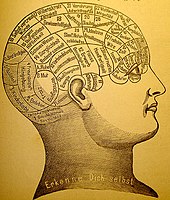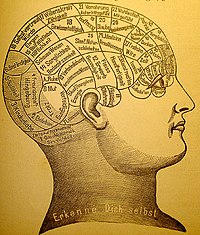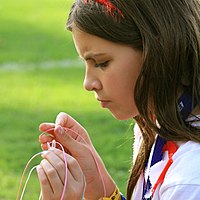
Whose (Extended) Mind Is It, Anyway?
Sign Up to like & getrecommendations! Published in 2019 at "Erkenntnis"
DOI: 10.1007/s10670-019-00172-9
Abstract: Presentations of the extended mind thesis are often ambiguous between two versions of that thesis. According to the first, the extension of mind consists in the supervenience base of human individuals’ mental states extending beyond… read more here.
Keywords: mind; interpretation; extended mind; mind thesis ... See more keywords

Associations between Emotion Regulation and Parental Reflective Functioning
Sign Up to like & getrecommendations! Published in 2019 at "Journal of Child and Family Studies"
DOI: 10.1007/s10826-018-01326-z
Abstract: Emotion regulation encapsulates the capability to successfully manage an ongoing emotional experience, particularly in social interactions, and thus may be especially significant to early parent-child relationships. In particular, the capacity to adjust emotions may support… read more here.
Keywords: reflective functioning; regulation; emotion regulation; mental states ... See more keywords

Robust modeling of epistemic mental states
Sign Up to like & getrecommendations! Published in 2020 at "Multimedia Tools and Applications"
DOI: 10.1007/s11042-020-09145-5
Abstract: This work identifies and advances some research challenges in the analysis of facial features and their temporal dynamics with epistemic mental states in dyadic conversations. Epistemic states are: Agreement, Concentration, Thoughtful, Certain, and Interest. In… read more here.
Keywords: robust modeling; facial features; epistemic mental; modeling epistemic ... See more keywords

Other minds are neither seen nor inferred
Sign Up to like & getrecommendations! Published in 2021 at "Synthese"
DOI: 10.1007/s11229-020-02844-4
Abstract: How do we know about other minds on the basis of perception? The two most common answers to this question are that we literally perceive others’ mental states, or that we infer their mental states… read more here.
Keywords: perception; minds neither; epistemology; mental states ... See more keywords

How social status influences our understanding of others' mental states.
Sign Up to like & getrecommendations! Published in 2018 at "Journal of experimental child psychology"
DOI: 10.1016/j.jecp.2017.12.008
Abstract: The current study investigated whether children's relative social status within a context influences their ability to identify others' mental states. Across two experiments, 3- to 7-year-olds (N = 103) were randomly assigned to hold either an advantaged… read more here.
Keywords: status; identify others; belief; social status ... See more keywords

The representational structure of mental states generalizes across target people and stimulus modalities
Sign Up to like & getrecommendations! Published in 2021 at "NeuroImage"
DOI: 10.1016/j.neuroimage.2021.118258
Abstract: Each individual experiences mental states in their own idiosyncratic way, yet perceivers can accurately understand a huge variety of states across unique individuals. How do they accomplish this feat? Do people think about their own… read more here.
Keywords: representational structure; states generalizes; states across; generalizes across ... See more keywords

Differential temporo-spatial pattern of electrical brain activity during the processing of abstract concepts related to mental states and verbal associations
Sign Up to like & getrecommendations! Published in 2022 at "NeuroImage"
DOI: 10.1016/j.neuroimage.2022.119036
Abstract: Refined grounded cognition accounts propose that abstract concepts might be grounded in brain circuits involved in mentalizing. In the present event-related potential (ERP) study, we compared the time course of neural processing in response to… read more here.
Keywords: brain activity; mental states; processing; abstract concepts ... See more keywords

Seeing mental states: An experimental strategy for measuring the observability of other minds.
Sign Up to like & getrecommendations! Published in 2018 at "Physics of life reviews"
DOI: 10.1016/j.plrev.2017.10.002
Abstract: Is it possible to perceive others' mental states? Are mental states visible in others' behavior? In contrast to the traditional view that mental states are hidden and not directly accessible to perception, in recent years… read more here.
Keywords: strategy measuring; measuring observability; perception; mental states ... See more keywords

The observability principle and beyond: Reply to comments on "Seeing mental states: An experimental strategy for measuring the observability of other minds" by Cristina Becchio et al.
Sign Up to like & getrecommendations! Published in 2018 at "Physics of life reviews"
DOI: 10.1016/j.plrev.2018.01.006
Abstract: Is it possible to directly perceive others’ mental states? Mediating the debate between Direct Perception and Inferentialism proponents would require knowing “what counts as an inference and how to tell the difference between inferential and… read more here.
Keywords: direct perception; observability; others mental; mental states ... See more keywords

The brain represents people as the mental states they habitually experience
Sign Up to like & getrecommendations! Published in 2019 at "Nature Communications"
DOI: 10.1038/s41467-019-10309-7
Abstract: Social life requires us to treat each person according to their unique disposition. To tailor our behavior to specific individuals, we must represent their idiosyncrasies. Here, we advance the hypothesis that our representations of other… read more here.
Keywords: state; represents people; habitually experience; brain represents ... See more keywords

Feeling Worse Before Feeling Better: A Case of Increased Disorganized Mental States Following Group Psychotherapy
Sign Up to like & getrecommendations! Published in 2017 at "International Journal of Group Psychotherapy"
DOI: 10.1080/00207284.2016.1260461
Abstract: ABSTRACT Is group therapy effective if it results in members revealing greater unresolved/disorganized mental states related to childhood trauma? That is, do patients have to more fully experience partially disavowed trauma before they get better?… read more here.
Keywords: group psychotherapy; group; disorganized mental; case ... See more keywords